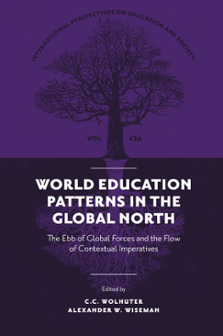
Index
ISBN: 978-1-80262-518-9, eISBN: 978-1-80262-517-2
ISSN: 1479-3679
Publication date: 1 September 2022
Citation
(2022), "Index", Wolhuter, C.C. and Wiseman, A.W. (Ed.) World Education Patterns in the Global North: The Ebb of Global Forces and the Flow of Contextual Imperatives (International Perspectives on Education and Society, Vol. 43A), Emerald Publishing Limited, Leeds, pp. 183-189. https://doi.org/10.1108/S1479-36792022000043A013
Publisher
:Emerald Publishing Limited
Copyright © 2022 C. C. Wolhuter and Alexander W. Wiseman
INDEX
- Prelims
- Terra Invicta: Comparative and International Education: A Field of Scholarship Testing Unprecedented Frontiers in the Twenty-first Century
- Terra Incognita: The Challenging Forces of the Unprecedented Twenty-first Century Globalized Societal Context
- Terra Nova: The Global Education Response
- The Globalization of Education in North America: A Discussion of Immigration, Identity, and Imagination
- Europa Regina: A Past, Present, and Future Project (A Quam Expeti Propositum)
- Baltic Countries: From Post-socialist to New-liberal Education?
- Mentoring of Marginalized Roma Students – Resource of Academic Success and Resilience
- Education in South-East Europe from the Perspective of the Europeanization Process
- Education in East Asia: Changing School Education in China, Japan, and Korea
- When Policymakers are Not True Believers: The Bounded Rationality of Policy Borrowing
- Index